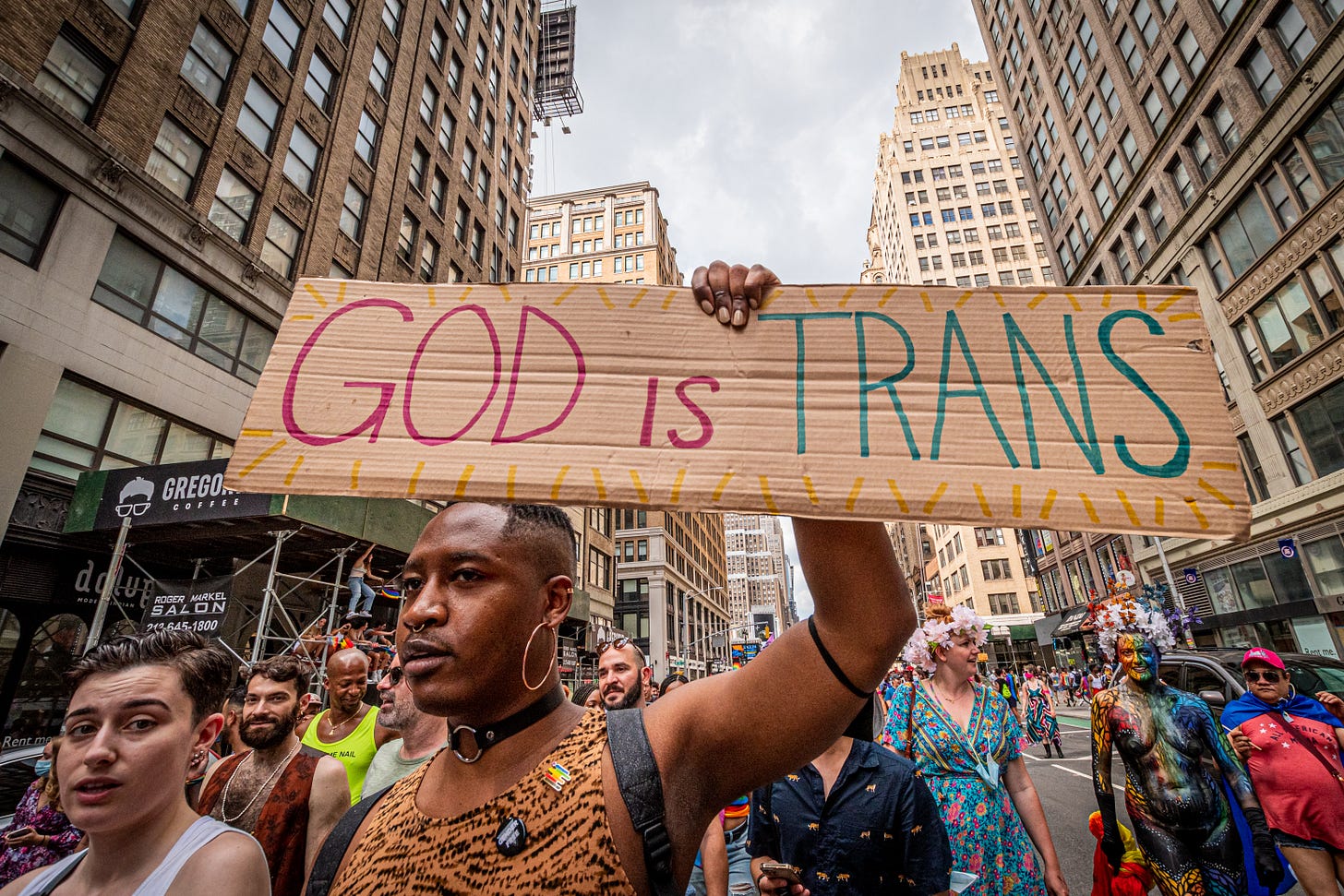
I’ve gotta say, the “postliberal” right does an excellent job with marketing.
One of the first tweets to appear in my feed on Monday morning was this one from co-founder of American Affairs and Viktor Orban fanboy Gladden Pappin:


Patrick Deneen, author of Why Liberalism Failed, arguing that “wokeness” is the “natural and inevitable outgrowth of liberalism”? That’s straight-up Linker catnip. It took me mere seconds to share a link to the piece along with an attempted rebuttal of Deneen’s claim:


Was this adequate? For a tweet responding to a tweet, sure. But if I really wanted to engage with and push back against the argument in a more serious way, I’d have to read the whole piece. That led me to click on the link, only to discover that roughly half of the essay is concealed behind a paywall. That was unfortunate—especially because the newsletter that published the essay doesn’t permit monthly subscriptions. I would have to pay for a whole year of “The Postliberal Order” just to read the rest of Deneen’s post.
Did I do it? You bet I did. Well played, postliberals. Well played.
The Postliberal Take on Wokeness
I’m honestly glad I did. I write a subscription newsletter titled “Eyes on the Right,” and the four gents behind “The Postliberal Order” (Deneen, Pappin, Chad Pecknold of the Catholic University of America, and Adrian Vermeule of Harvard Law School) are among the most interesting, radical, and intellectually formidable right-wing thinkers writing today. So of course I should be subscribing to their Substack (and claiming a tax deduction for doing so).
Yet it’s also the case that Deneen’s post isn’t quite what Pappin’s promotional tweet led me to expect. (Hard to believe, I know.) Instead of applying to wokeness the logic of Deneen’s bestselling 2018 book—explaining how present-day trends in progressive political engagement were prefigured in the writings of classical liberals like John Locke—the essay on “The Liberal Origins of the Great Awokening” is mainly an exercise in point-scoring against center-right liberals Bret Stephens of The New York Times and Bari Weiss, formerly of the Times and now the proprietor of the “Common Sense” newsletter and “Honestly” podcast on Substack.
Apparently Deneen spent two hours several weeks ago debating Stephens about whether America in 2022 has too much or two little liberty, and now that conversation has been posted on Weiss’ podcast. Deneen’s position, it will surprise no one to learn, is that (in his words) “our worsening contemporary pathologies—both social and economic—have arisen from too much bad freedom, and not enough good liberty—i.e., too much liberalism, and not enough classical and Christian liberty.” Stephens disagrees.
That disagreement persisted as the conversation moved on to exploring the origins of wokeness. To quote the full passage that got highlighted in that promotional tweet:
For Bret Stephens—and, I suspect, Bari Weiss—progressive wokeness is an aberration from good, old-fashioned liberalism. What I attempted to convey to both of them, and to her audience, was that the key elements of “wokeness” arise not from some successor philosophy, such as “cultural Marxism,” as most classical liberals wish to claim. Rather, I argued, it is the natural and even inevitable outgrowth of liberalism’s core feature of transgression.
That certainly raised my hopes for an impressive political-theory pole vault—exactly the kind of extension of the argument of Why Liberalism Failed that Pappin’s promotion led me to expect. Even Deneen’s immediate pivot to invoking John Stuart Mill (whom Stephens mentioned on the podcast as an exemplary liberal) made intuitive sense to me, since he’s exactly the kind of author I’d assume Deneen would make use of in attempting to link classical liberalism with contemporary wokeness.
But I’m sorry to report that Deneen fails to stick the landing. I certainly understand why a traditionalist conservative and pious Catholic like Deneen would strongly dislike Mill, with his advocacy not just of political but also social freedom, including “experiments in living.” (Hence Deneen’s emphasis above on the crucial importance of transgression.) But it’s not at all clear from what he writes in this essay how that theme in Mill is necessarily connected with his advocacy of historical progress, his supposed contempt for the masses within liberal nations, and his endorsement of imperialism abroad—all themes quickly and haphazardly introduced in the essay’s concluding paragraphs. Neither is it clear how this jumbled series of topics connects up with the essay’s ostensible subject: contemporary wokeness.
Wokeness as Liberal (Post-)Protestantism
Rather than attempting to criticize Deneen’s essay along the lines of what I tweeted on Monday morning, I’m now inclined to think the less said about it, the better. Instead, I’d rather treat its publication as an occasion to clarify for my readers what I think wokeness is and isn’t, including where it comes from and where it might be going.
I agree with Deneen in rejecting the “cultural Marxism” label. The Marxist tradition of social and economic thought just doesn’t play a very substantial role in American politics—and wokeness is a very American phenomenon. Yes, it can be found these days to varying degrees throughout the liberal-democratic world, but it’s often rightly recognized as a cultural export from the United States that’s getting disseminated across the globe via social media and American popular culture. Its ability to take root in many different places speaks to its broad-based appeal among younger progressives, but that doesn’t change the fact that it originates here.
So is it, as Deneen’s more sweeping formulations proclaim, an expression of liberalism? Not in the sense that there is some hidden implication in the Locke’s Second Treatise, Montesquieu’s Spirit of the Laws, and James Madison’s contributions to the Federalist Papers that points inexorably toward the arguments of Judith Butler, Robin DiAngelo, and Ibram X. Kendi—let alone that it primes 21st-century left-wing activists and human-resource managers to accept the validity of these arguments.
Yet there may be another sense in which there is nonetheless a deep kinship between wokeness and liberalism—not as a political theory but as a religious and moral dispensation.
As author Joseph Bottum noted in an underrated 2014 book, a number of trends on the activist left in our time recapitulate the analytical moves of liberal Protestant theologians writing a century or more earlier as part of the “social gospel” movement. To distill a set of complex ideas down to a short and therefore inevitably inadequate description, these politically engaged religious thinkers believed that Christianity was on the cusp of reaching its historical apotheosis by jettisoning formal dogmas and doctrines while turning its energies outward, toward the creation of a world that actualized the moral teachings of Jesus Christ by way of an inner transformation of individuals. In this way, people as well as the political system as a whole could become more thoroughly secular and more intensely Christian at one and the same time.
As a form of religious life, the social gospel movement looked back to the Puritans and their impatience with religious forms and emphasis on right behavior—and also forward to our own day, when activists often throw themselves into causes with a moral fervor that can only be described as missionary.
This is the sense in which I consider wokeness to be continuous with the multifaceted liberal tradition— not as an outgrowth of liberal politics but as the latest iteration of liberal Protestantism (or post-Protestantism).
Some will find this claim ridiculous because those who proselytize most fervently for woke causes so rarely do so for explicitly religious or spiritual reasons. Yet we need to remember the liberal Protestant tradition’s paradoxical (or perhaps dialectical) relation to secularism: As the light of the moral truth spreads throughout the world—with resisters publicly humiliated and shunned, and institutions reconstituted to enforce this truth—the Christian teaching reaches fulfillment, even if no one in the world actively affirms scripture, abides by ecclesiastical rules, or even thinks of themselves as members of a church.
To me, this explains a lot of what we see from wokeness: its combination of attacks on forms (structural racism, the gender binary) with the demand for public expressions of contrition and “allyship” with “marginalized communities”; its relative indifference to debating the nuances of public policymaking in favor of sloganeering and intensely moralistic calls to individual conversion; its conviction that those who disagree are not just wrong but evil; and its quasi-providential way of associating its agenda with the achievement of historical progress.
The Future of Wokeness
If I had to venture a guess or prediction about the future of wokeness, I’d say it’s likely to burn itself out over the coming years, like previous Great Awakenings in American history. But its spread around the globe opens up another possibility—namely, that wokeness speaks to a spiritual longing in the souls of 21st century people (especially young people) who hunger for some higher meaning and purpose in their lives. As the most spiritually attuned of the classical liberal thinkers understood, it’s possible for human beings to find such spiritual sustenance by contributing to a multigenerational project of actualizing the highest moral good in the world.
Wokeness may well open up a secular path to spiritual fulfillment in a way that appeals to otherwise faithless people around the world. If so, it could circulate for many years, overturning received norms and practices, and provoking right-wing backlash, everywhere it goes. It might then ultimately return through the echo chamber of viral social media to the place of its birth, after it has already faded there, to surge forth again among a new cohort of spiritually starved young Americans.
That could make wokeness an enduring (or endemic) problem worthy of a serious response. I’m just not convinced we’re likely to get an especially cogent or compelling one from the right-wing postliberals.
UPDATE: The original version of this post contained two errors. I misspelled Gladden Pappin’s first name and incorrectly stated that Chad Pecknold teaches at the University of Notre Dame. He teaches at the Catholic University of America. I regret the errors.





As a postliberal, I really enjoyed your take.
While it's not technically correct, one must also understand the need to refer to things one does not like as Marxian or Communist, since many of the American people have been conditioned to despise those things. Much like Peter Canisius who linked protestant religion with things odious to the Poles and Germans. As a devotee of the counterreformation, one needs no new insight on that which is merely a manifestation of evils past.
Since I see 'woke' in this context as more of a snarl-word than as a word with well-defined and -limited correlates, this seems inevitable to me. Among those who use it as a snarl-word: those who like liberalism and dislike Marxism will want it to be 'Marxist', those who dislike liberalism will want it to be 'liberal', and if on the Right will likely see Marxism as an inevitable consequence of liberalism anyway. For those for whom it is a purr-word: those who like Christianity will hold it 'Christian', atheists will see it as 'post-theist'….
(All of the above _could_ be accompanied by good or bad or mediocre or B.S. arguments, but those are optional: the important thing is to try to fix it in the local canon of [e.g.] snarl-words, all of which are in the end equivalent because functionally interchangeable because they are used not to convey meaning but to create a strong, negative, response. This is why the end-state of much Rightist political rhetoric is to invoke 'pædophile', which does the job so well.)
(Note: I don't know much about General Semantics, and am biassed against it because it seems to have been somewhat cult-y, but I find the snarl/purr-word concept extremely useful for understanding political 'argument'.)